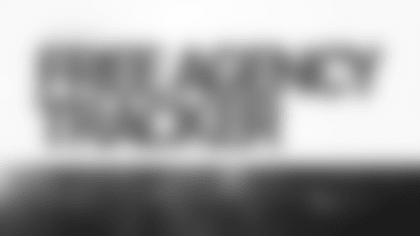Join jaguars.com senior editor Vic Ketchman as he tackles the fans' tough questions.
Keith from Jacksonville:
Can the Jags declare all of Hugh Douglas' remaining $4.8 million in amortization this year and have him off the books forever after that?
Vic: The answer is no. That $4.8 million is part of Hugh Douglas' original $6 million signing bonus, and signing bonus must be divided evenly over the life of the contract. That means $1.2 million was assigned to each of five salary caps. Go back to "Salary Cap 101" and the rule regarding players who are cut after June 1 and have multiple years remaining on their contract: What's in the year, stays in the year; everything else goes into the next year. Applying that rule, the $1.2 million amortization that is assigned to the 2004 salary cap stays on the '04 cap, and the $3.6 million that will remain after this season will be assigned to the Jags' '05 cap. Tony Brackens is the opposite example. Because the Jaguars originally cut him prior to June 2, all of the remaining amortization from his previous contract will be expired on this year's salary cap. That was the intent.
Brian from Jacksonville:
While looking at recent NFL transactions, I noticed that some players are placed on injured reserve and others on the physically unable to perform list. What is the distinction between the two?
Vic: Players on the injured reserve list are lost for the season. Players designated physically unable to perform have a window of opportunity between weeks six and nine of the regular season to return to the active roster. At that time, teams must make a decision on a PUP player: Put him on the active roster, the injured reserve list or waive him. The PUP list is for players with injuries from the previous season.
Chris from Gainesville, FL:
Is a kicker like Christie expected to be able to kick right away or does he have to familiarize himself with the new team's system and plays?
Vic: It's not about playbooks for kickers, it's about holders. Steve Christie is an old pro. He's been around the block and he knows what's expected of him now: Make the kick.
John from Jacksonville:
I know trades are not all that common in the NFL, but I have always thought there should be just a few more. In our case, Hugh Douglas is still regarded as a top defensive end in the league. I know he may not be worth a first-round choice, but we might have been able to squeeze out a second-round pick or an early third from a bad team. Are player-for-pick trades underused in the NFL today, and does the mandatory cutdown of preseason make them less common?
Vic: You're dreaming. Who was going to trade a draft choice to pick up Hugh Douglas' $3.345 million salary? We've been over this and over this. It's about the salary cap. That's why you don't see more trades. When you trade a player, all of his remaining amortization accelerates onto this year's salary cap. Usually, that prohibits teams from trading big-money guys. Looking at it from the other side, trading for a player means assuming his contract. If he's being traded because the team he's on doesn't think he's worth his salary, then why would another team want to pay that salary? The bottom line is this: In the NFL, draft picks have long been considered to be more valuable than players.
Dave from Woodbridge, VA:
It appears we're going to have ample cap room heading into the season. Even leaving room for operating expenses and potentially even signing another player or two waived from another team's roster, we are going to have unused cap room. Might the Jaguars modify some players' existing contracts to accelerate payments to lessen their cap hit next year and in future years? And what is the latest point in the season that such moves might be made and still count toward this year's cap?
Vic: You answered your own question. Nobody ends the season with room left on their salary cap. They move money forward, which is what the Jaguars did last season when they signed Brad Meester to a new deal. If the Jaguars have cap room they don't expect to use this year, I would expect them to do the same thing with another core-type player. Teams have until the end of the regular season to execute new deals and assign money onto that year's cap.
Robert from Chicago, IL:
With the recent cutting of big-name vets, could Donovin Darius be next in line? I actually like him as a player. What are the odds he is retained this year or beyond (given he plays well)? Will salary make his release inevitable?
Vic: It's just the opposite. Donovin Darius' salary is guaranteed because the Jaguars put the "franchise" tag on him and he signed the tender. That means the Jaguars would have to pay Darius $4.1 million if they cut him. If they traded him, however, his new team would accept the liability for his $4.1 million salary. Let's examine the situation. Darius and the Jaguars remain unable to reach a new contract. That's not what any team or player wants. The safety position has become crowded and Deke Cooper is clearly pushing Darius for the starting job, which is the kind of problem you want, but only if it allowed you to avoid paying that $4.1 million salary. But, in this case, it doesn't because the money is guaranteed. In my opinion, if Cooper was to win that strong safety job, the sensible move for the Jaguars would be to trade Darius. They would have to find a team with a desperate need at safety and a lot of room on its salary cap.
Al from Jacksonville:
I'm a big Jag fan. Will we ever see a run and gun offense?
Vic: Repeat after me: Defense, defense, defense.













